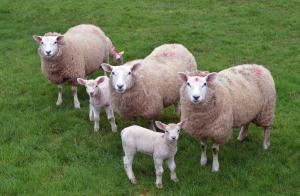Schmallenberg virus (SBV) was first identified in Germany in late 2011 as a cause of malformations in newborn calves and lambs. This virus can cause a temporary dip in production, such as milk output. However, the greatest economic impact comes from abortions, stillbirths and birth defects that can result when pregnant animals are affected.

AFBI has recently detected SBV in eight ovine abortion cases in Counties Fermanagh and Tyrone. In all of these cases the lambs submitted have had evidence of arthrogryposis (hyperflexion of the joints) of the hind limbs and fore limbs. Torticollis (wry neck) has also been observed. Further diagnostic testing has revealed the presence of Schmallenberg virus in the brain, lung and spinal cord sampled from seven of the cases. Whilst in one of the cases no virus was detected in the samples tested, antibodies to SVB were detected in foetal fluid indicating exposure to the virus by the lamb whilst in the womb. These are first virus positive cases confirmed by AFBI in the west of the province. The Department of Agriculture, Food and the Marine in the Republic of Ireland have also recently reported suspected cases in counties Sligo, Cavan and Leitrim. Antibody has also recently been detected in blood samples from ewes in Armagh, Antrim and Fermanagh, indicating exposure to the virus or vaccination.
Schmallenberg virus was first detected in Northern Ireland in a cattle herd in County Down in October 2012. Three further cases were confirmed the following spring in County Down in two cattle herds and one sheep flock. In 2017, the virus reappeared and was detected in one ovine abortion in County Down. Last year AFBI also detected positive tests for antibodies to Schmallenberg in two calves born with skeletal deformities and a cow from a herd experiencing abortions and calf abnormalities, providing evidence that the virus was circulating again in Northern Ireland.
Schmallenberg virus is transmitted to livestock by Culicoides biting midges. These midges are very effective at transmitting SBV and are very difficult to control, or prevent from spreading the virus. Although they are less active during the colder winter months, temperatures last winter were not low enough across the British Isles to kill all infected midges.
Problems with malformed calves and lambs arise when pregnant cows and sheep are exposed to the virus during a critical time window in early to mid-pregnancy. Following infection, exposed animals may give birth to malformed progeny but are likely to develop a strong immunity to subsequent infection. They are therefore unlikely to suffer any ill-effects if exposed to the same virus in subsequent years. Commercial vaccines against the Schmallenberg virus are also available for use in cattle and sheep.
Farmers who suspect problems caused by SBV in their flocks or herds, should seek advice from their private veterinary surgeons on the most appropriate action, including on the submission of samples to AFBI’s veterinary laboratories at Omagh and Stormont.
There is no evidence of any risk to humans from SBV infection.
Schmallenberg Virus (SBV) Key Facts:
- Caused by a new orthobunyavirus, a group of viruses not found in northern Europe until 2011
- Vectored by insects from the genus Culicoides, which are indigenous to NI and active during April to early December
- At the time of infection the virus can cause transient fever, diarrhoea and milk-drop in cows
- More significant clinical picture is of:
- an increase in lambs, calves & kids born dead or weak, at or near their due date
- lambs, calves & kids born with varying degrees of fused or stiff limb joints, twisted spines, or abnormal skulls or jaws
- Affects ruminants but no evidence to date that it causes disease in humans, or non-ruminant species such as horses or pigs
- Highest risk period is when mother is infected in early-mid pregnancy
- Commercial vaccines for Schmallenberg virus are available
- Schmallenberg is not a notifiable disease
- DAERA does not impose any restrictions on infected holdings
Notes to editors:
- AFBI carries out high quality technology research and development, statutory, analytical, and diagnostic testing functions for DAERA and other Government departments, public bodies and commercial companies.
- AFBI's Vision “Advancing the Local and Global Agri-Food Sectors Through Scientific Excellence”.
- All media enquiries to AFBI Press Office
Latest news
- AFBI issues Nematodirus warning – Spring 2025 11 April 2025
- Managing Nature Based Risks to the UK Economy and Opportunities for Green Finance 08 April 2025
- AFBI Hillsborough host AERA committee 27 March 2025
- The Omics Days Conference 27 March 2025
